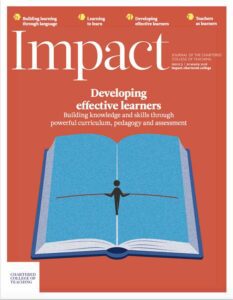Joining the dots: Using lesson study to develop metacognitive teaching

‘Metacognition and self-regulation’ and ‘collaborative learning’ remain high in the EEF Teachers’ Toolkit of effective teaching approaches, and with good reasons. These reasons can be framed through the following hypotheses. Firstly, to become metacognitive and self-regulating, learners need to experience learning situations, activities and content that can best be resolved, understood and applied through opportunities to engage in dialogue with others. Secondly, through engaging with collaborative learning and dialogic teachingThe effective use of talk for teaching and learning, involvi... More, learners become more adept at grappling with the complexities and challenges that they encounter through the curriculum and in life. Finally, to teach for metacognition and self-regulation, teachers need to experience both for themselves in their own learning to teach. It is these three hypotheses that form the basis of this case study, with a focus on a PGCE module through which student teachers use an adapted lesson study approach to develop a repertoire for teaching thinking skills.
A brief and incomplete history
Teaching for metacognition has a strong history, which illustrates the potential relationship between pedagogic practices and research as an upwardly expanding spiral, meaning that we do not just revisit ideas but can also build on them, making them more nuanced and more impactful. As Wood (Wood, 1998) states in How Children Think and Learn, both Vygotsky and Bruner propose that language and communication are at the heart of intellectual and personal development. Their work influenced a range of curricular and pedagogic approaches that shared objectives to teaching thinking skills, including Dialogic Teaching (Alexander, 2017). Note the inclusionAn approach where a school aims to ensure that all children ... More of ‘teaching’, which emphasises the active instructional and facilitative role of the teacher. Teaching for metacognition and self-regulation is a tight and skilled process, not a laissez-faire pedagogy.
Twenty years ago, Newcastle University PGCE tutors worked with secondary and primary teachers to refine professional practices and understanding in ‘Thinking through…’ networks, to create a subject-based infused approach to teaching thinking skills (e.g. (Baumfield, 2002)). These differ from many current interventions because they promote the teacher design and application of a repertoire of Powerful Pedagogic Strategies (Leat and Higgins, 2002), such as ‘odd one out’, ‘mysteries’ and ‘living graphs’. Critically, these are not deployed out of context, but are infused within schemes of work, and develop thinking skills attuned to subject knowledge and skills. For example, teachers can adapt the ‘living graph’ approach to a range of contexts in science, geography, history and sport science, as well as data handling and statistics. Developing the professional skills to design bespoke lessons using Powerful Pedagogic Strategies can make a huge difference to teaching and learning. This was well evidenced by Leat and Nichols (Leat and Nichols, 1999), who showed how students’ thinking became visually articulated as they put their ‘brains on the table’ using Mysteries, allowing teachers’ real time insight into their understanding and misconceptions.
Learning through lesson study
One of the legacies of this work at Newcastle University is the desire to bring the knowledge of Powerful Pedagogic Strategies into current teacher education, resulting in a master’s-level module. The module enables student teachers to develop their practice in teaching thinking skills using a modified form of ‘lesson study’. This is based on collaborative planning, observing and reflecting on lessons with specific attention being paid to a selected group of pupils and their learning (Dudley, 2014) ; (Dudley, 2015). The process helps student teachers to develop a critical perspective on teaching thinking skills in a ‘safe’ and supportive but challenging environment, as highlighted by student teachers in the 2017–18 cohort:
‘Working with peers gave a different level of feedback than that from mentors – it felt more honest – it was easier to use it as a starting point for changing my practice.’
‘It was great working with someone outside my subject, I learnt so much that I can apply in my practice to enable me to engage my students.’
It is significant that lesson study is driven by the participants and is characterised by the reciprocal sharing of ideas and strategies in their own classrooms. This allows for authentic professional learning, as student teachers start to integrate evidence from practice, theory and research. This can change their understanding of the significance of developing a wide subject-teaching repertoire, to which teaching for metacognition contributes. Their master’s-level assignments provide evidence that they start to apply criticality to their own practice and help them to understand how they can improve the learning experience for their pupils.
‘It is not enough to do a series of activities in class; we need to understand the impact on our students thinking of what we are doing and consider alternative approaches.’
‘The pupils were consulted in the planning of the lessons, which I believe gave them a sense of pride and ownership… Students’ engagement and enthusiasm was evident throughout the lesson… I will certainly do this in my future practice.’
Looking beyond the toolkit: Powerful Pedagogic Strategies
When Leat and Higgins (Leat and Higgins, 2002) coined the term Powerful Pedagogic Strategies (PPS), they did so deliberately, demonstrating that:
- PPS represent manageable units of change for teachers aiming to innovate
- PPS are flexible across subjects, ages and curriculum contexts
- PPS have no single correct answer so they encourage engagement with ideas
- PPS extend our understanding of subject knowledge from something to be mastered to becoming the stimulus to reasoning
- PPS encourage exploratory talk between pupils and provide rich learning experiences suitable for metacognitive plenary (debrief).
As such, the power of PPS is that they can transform both the acts of teaching and learning, as well as the self-efficacy of both the teacher and learner.
Lesson study can have a profound effect on how student teachers see themselves as classroom practitioners and how they move forward. It can change their idea of themselves and move them from technician/apprentice to professional.
‘It wasn’t just the pupils who were learning how to think; working with my partner really made me think about my practice.’
‘All teachers should have the opportunity to engage in lesson study. If necessary, I would trial it and then take my case to the head teacher.’
It could be argued that lesson study is itself a powerful professional learning strategy because it creates an environment in which teachers themselves work and learn collaboratively to become more metacognitive and self-regulating. More productive collaboration may also start to ease the workload crisis, while promoting the creative and intellectual basis of teaching.
References
About the Author
Rachel Lofthouse is Professor of Teacher Education in the Carnegie School of Education at Leeds Beckett University. Rachel has a specific interest in the link between practice development and professional learning for teachers and educators, based on innovative pedagogies and curriculum design and collaborative practices for coaching and mentoring.
-
This author does not have any more posts.










